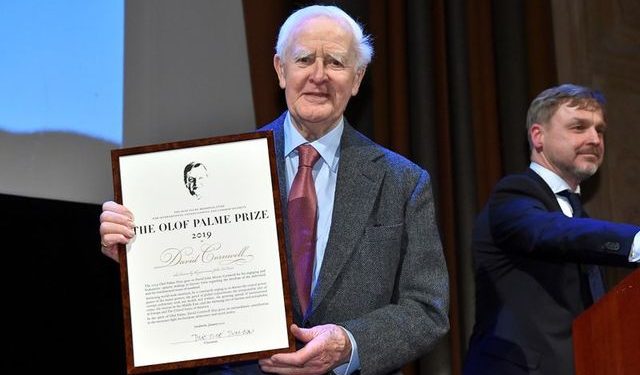London: ‘Tinker Tailor Soldier Spy’ author John le Carre, who cast flawed spies on to the bleak chessboard of Cold War rivalry, has died aged 89. Savid Cornwell, known to the world as John le Carre, died after a short illness in Cornwall, southwestern England, Saturday evening. He is survived by his wife, Jane, and four sons. The family said in a brief statement Sunday evening that John le Carre died of pneumonia.
“Very sad to hear the news about John le Carre,” said Richard Moore, the chief of Britain’s MI6 foreign intelligence agency.”“A giant of literature who left his mark on MI6 through his evocative and brilliant novels,” he added.
By exploring treachery at the heart of British intelligence in spy novels, Le Carre challenged Western assumptions about the Cold War. He defined for millions the moral ambiguities of the battle between the Soviet Union and the West.
Le Carre’s characters were unlike the glamour of Ian Fleming’s unquestioning James Bond. His heroes were trapped in the wilderness of mirrors inside British intelligence. It was reeling from the betrayal of Kim Philby, who fled to Moscow in 1963.
“It’s not a shooting war anymore, George. That’s the trouble,” Connie Sachs, British intelligence’s resident alcoholic expert on Soviet spies, tells spy catcher George Smiley in the 1979 novel ‘Smiley’s People’. “It’s grey. Half angels fighting half devils. No one knows where the lines are,” Sachs says in the final novel of Le Carre’s ‘Karla’ trilogy.
The Cold War, for Le Carre, was ‘A Looking Glass War’ (the name of his 1965 novel) with no heroes. Morals were up for sale – or betrayal – by spy masters in Moscow, Berlin, Washington and London.
Such was his influence that Le Carre was credited by the Oxford English Dictionary with introducing espionage terms such as ‘mole’, ‘honey pot’ and ‘pavement artist’ to popular English usage.
British spies were angry that le Carre portrayed the MI6 Secret Service as incompetent, ruthless and corrupt. But they still read his novels. Other fans included Cold War warriors such as former US President George HW Bush and former British Prime Minister Margaret Thatcher.
Soldier spy
David John Moore Cornwell was born October 19, 1931 in Dorset, England, to Ronnie and Olive. His mother, despairing at the infidelities and financial impropriety of her husband, abandoned the family when he was five years old.
Mother and son would meet again decades later though the boy who became Le Carre said he endured ‘16 hugless years’. In that period he was in charge of his father, a flamboyant businessman who served time in jail.
At the age of 17, Cornwell left Sherborne School in 1948 to study German in Bern, Switzerland, where he came to the attention of British spies. After a spell in the British Army, he studied German at Oxford, where he informed on left-wing students for Britain’s MI5 domestic intelligence service.
Le Carre was awarded a first-class degree before teaching languages at Eton College, Britain’s most exclusive school. He also worked at MI5 in London before moving in 1960 to the Secret Intelligence Service, known as MI6.
Posted to Bonn, then capital of West Germany, Cornwell fought on one of the toughest fronts of Cold War espionage: 1960s Berlin.
As the Berlin Wall went up, Lle Carre wrote ‘The Spy Who Came in from the Cold’” where a British spy is sacrificed for an ex-Nazi turned Communist who is a British mole.






































